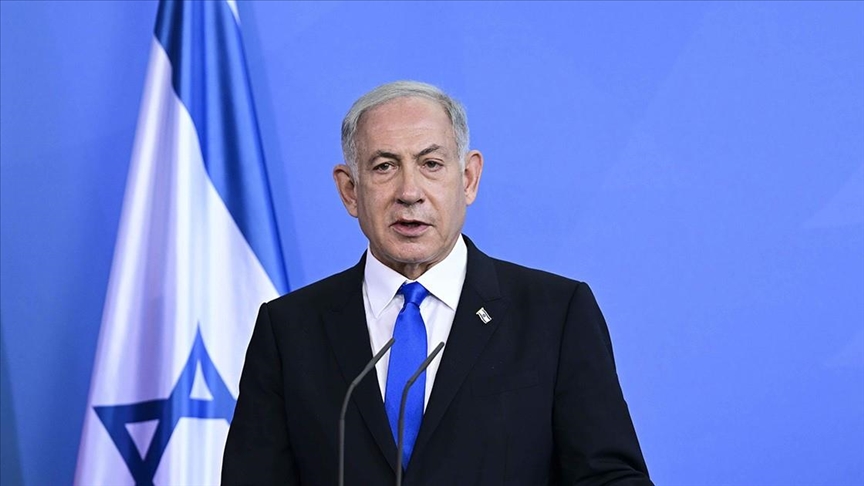Tornado of Scandal: Netanyahu’s Alleged Cover-Up in War Cabinet Meetings
In the eye of the storm, Israeli Prime Minister Benjamin Netanyahu is facing a burgeoning scandal that has critics questioning the integrity of his administration amid ongoing military engagements. Reports surfaced that Netanyahu’s office may have issued directives to suspend the recording of war cabinet meetings, a blatant deviation from established security protocols.
 Netanyahu’s office is embroiled in controversy over halted recordings during crucial security meetings.
Netanyahu’s office is embroiled in controversy over halted recordings during crucial security meetings.
The events unfolded post-October 7, when Israel escalated its offensive in Gaza. It was during this critical juncture—discussions held at the Defense Ministry in Tel Aviv— that Netanyahu’s decision to halt the recording of these meetings came into question. Initial security practices dictated that all conversations should be documented for future accountability, yet this standard was allegedly dismissed by close aides of the Prime Minister. According to Yedioth Ahronoth, after initially recording the discussions, Netanyahu’s circle claimed that such recordings were unnecessary, effectively disregarding longstanding protocols that are crucial in times of conflict.
Further compounding the matter, Channel 12 News reported that Netanyahu’s office is under investigation for allegedly attempting to blackmail a military officer with sensitive footage, aiming to gain access to modify records from those pivotal meetings. These developments come as former military secretary Avi Gil has brought attention to suspected irregularities, urging Attorney General Gali Baharav-Miara to intervene.
As the investigation unfolds, Israeli police’s Lahav 433 unit has opened a probe focusing on document forgery claims intertwined with the ongoing Shin Bet investigation related to leaks of classified intelligence. Understandably, public trust in Netanyahu’s administration has been shredded, particularly with accusations that officials appear to be shifting blame for alleged failures prior to the outbreak of unrest leading to heightened tensions in the Gaza region.
The consequences of the October offensive have been devastating, with over 43,500 Palestinian deaths reported and Gaza teetering on the brink of humanitarian catastrophe. As international pressures mount, including a looming case at the International Court of Justice over accusations of genocide, the situation remains precarious for Netanyahu. The fallout from his administration’s alleged misconduct could hinder any defense against these serious international claims.
Contentious Conspiracies and Accountability
The scandal surrounding Netanyahu is not the only brewing controversy in a world increasingly driven by political and ethical quandaries. In a separate incident, five Election Commission officials in Ulhasnagar, India, have found themselves under investigation for alleged bribery. Accused of extorting Rs 75,000 from a flower trader during a routine check, these officials allegedly mishandled proper protocols when the trader presented documentation declaring his possession of Rs 7.5 lakh.
Bribery controversies cast shadows over electoral integrity in India.
The incident raises significant concerns about corruption within election processes, as the trader reportedly divulged that he was financially coerced by the chief election official, Sandeep Siraswal, who threatened to seize the cash if he did not comply. Though the money was later returned, the implications of the officials’ actions reflect a broader narrative of corruption that can severely undermine democratic processes.
These two instances, though geographically and politically distinct, resonate with the overarching theme of trust—and the erosion of it—in leadership. Both cases illustrate the fragility of democratic integrity in the face of unethical practices, whether in Israel or India.
The Broader Implications
As these scandals unravel, they signal not only potential repercussions for the individuals involved but also for the institutions they represent. Netanyahu’s governmental stability is being scrutinized amidst military aggression, while the Indian election scenario has potentially scarred public perception of the electoral process itself.
Both instances converge to highlight the essential nature of transparency, integrity, and accountability within governmental structures. The fallout from such revelations prompts a critical need for reforms aimed at restoring public trust and ensuring that the rule of law prevails, particularly when national security and citizens’ rights are at stake.
As we watch these stories develop, one can’t help but wonder what the future holds. The resonating question becomes: how will leadership navigate the turbulent waters of public scrutiny, accountability, and ethical governance? The answers might not only shape the political landscape but also redefine the relational dynamics between governing bodies and the citizens they swear to protect.
For those yearning for deeper insights into these unfolding cleavages in governance, you can explore further through our detailed reporting on Netanyahu’s Scandal and India’s Bribery Allegations. Each narrative is a fragment of a broader conversation on the fragility of ethics in modern governance.
As we continue to cover ongoing events, stay engaged with diverse perspectives on the perils that threaten the core fabric of democratic institutions worldwide.
Conclusion
The implications of political scandals in Israel and India intertwine through a shared narrative of compromised integrity at the highest levels. Both cases not only reflect on individual culpability but also raise serious ethical questions about the capabilities of current leadership in managing their responsibilities transparently. As more revelations come to light, it remains vital for the public to demand accountability and uphold the principles that bind a democratic society.
Stay updated on these significant events and their ramifications through Gamerag as we bring you exclusive insights and the latest developments.


 Photo by
Photo by 












